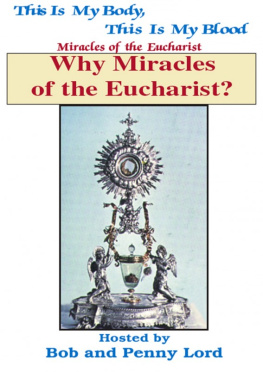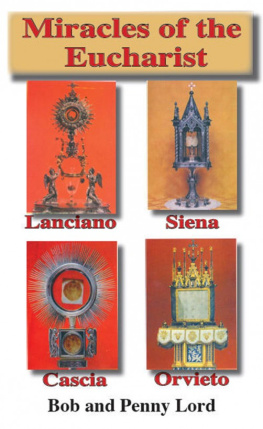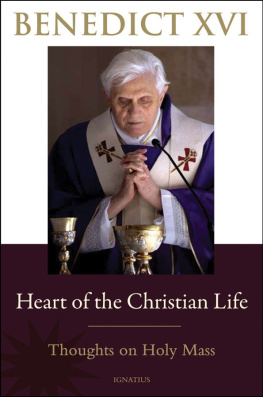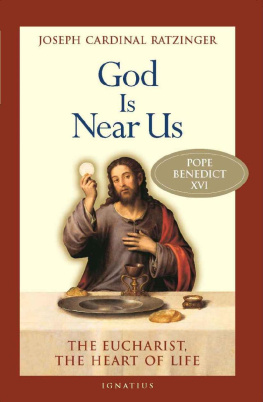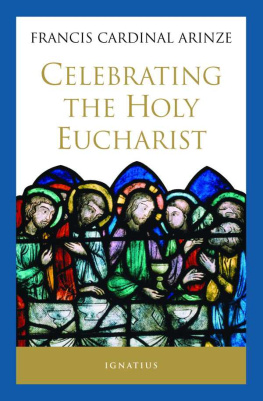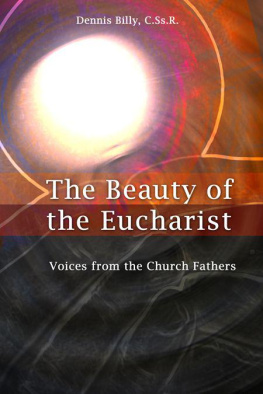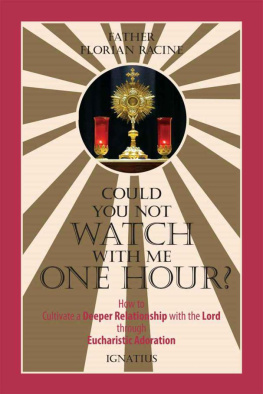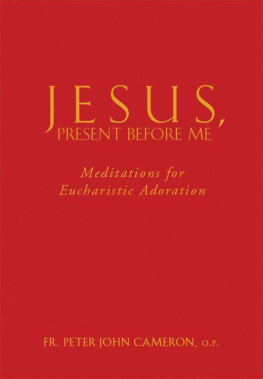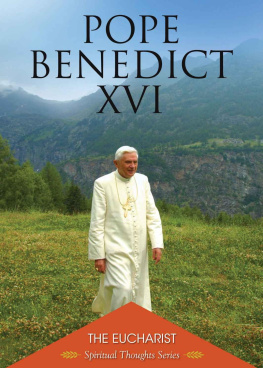Beyond the Body
An Antitheology of the Eucharist
James J. Heaney
BEYOND THE BODY
An Antitheology of the Eucharist
Copyright 2014 James J. Heaney. All rights reserved. Except for brief quotations in critical publications or reviews, no part of this book may be reproduced in any manner without prior written permission from the publisher. Write: Permissions. Wipf and Stock Publishers, W. th Ave., Suite , Eugene, OR 97401 .
Pickwick Publications
An Imprint of Wipf and Stock Publishers
W. th Ave., Suite
Eugene, OR 97401
www.wipfandstock.com
ISBN : 9781-62564687-3
Cataloguing-in-Publication Data
Heaney, James J.
Beyond the body : an antitheology of the Eucharist / James J. Heaney.
xii + p. ; cm. Includes bibliographical references and index.
ISBN 13: 9781-62564687-3
EISBN 13: 9781-63087-497-1
Philosophy and religion. Lords SupperReal presence . I. Title.
BV825.3 .H43 2014
Manufactured in the U.S.A. 10/08/2014
Unless otherwise noted, the scripture quotations contained herein are from the New Revised Standard Version of the Bible, copyright 1989 the Division of Christian Education of the National Council of the Churches of Christ in the United States of America. Used by permission. All rights reserved.
For Elfriede
Preface
This book takes its start from a conviction that faith is not something occasioned and initiated by either doctrine or theology but is rather a configuration of experience that comprises what is for each of us the world. As such it is the basis for a resident willingness to assent to statements drafted to represent publicly what faith is about, while keeping always in mind how slippery and provisional the interface between experience and attempts to describe it may be. The vocabulary ordinarily at our disposal to describe such a faith is either suspect or circular. To call it a state of mind requires agreement on what mind refers to or if, properly understood, whether there even is such a thing. Intuition, representing as it does thought processes or events independent of rational argument, comes closer, but is largely restricted to assessing individual events or situations rather than the interrelated global apperceptions characteristic of the life of faith. Outlook is another helpful analogy, once we set aside that it refers mostly to prediction or expectation based on faith rather than on faith itself. Lastly, conviction speaks to the potential faith has for action but, again, this cannot exist without an objective corollary, a statement of what that conviction is of . Before doctrine and certainly before theology there is faith. What can we say about that faith as it directs itself to the Jesus who is the focus of the Eucharist?
The Western theological tradition, dominated by apologetic concerns since the thirteenth century, has with remarkable consistency maintained an order of business that makes a simple, unqualified, belief in the existence of God the intellectual preamble to everything else in matters of religion. The more rationalist side of that tradition left largely unsaid the implication that doctrines concerned with salvation, church, sacraments, and in this case the Eucharist, proceed from the doctrine of God in somewhat the same manner that the Son and the Spirit proceed from the Father in the Trinity. Were God not to exist, none of these would make any sense; they are ultimately dependent upon that existence in both logical and practical terms. The more biblical side of that tradition is founded upon the great truths of salvation history but is guided by much the same conviction: a theology of redemption, including one of sacraments, would be senseless without a world and its resident humanity to redeem. It comes as no surprise, therefore that in the summas, institutes, and dogmatics of both traditions questions about sacraments, and the Eucharist in particular, come so much later in the agenda than everything else, the baggage of religion rather than its substance.
The imbalance of this first became clear to me quite by accident. A student, luckily someone elses student, asked about my work on this subject. Thinking primarily of the more demanding formulations of the doctrine of the Real Presence, I off-handedly replied that rather than a mystery it sometimes seemed more like a mystery story with a title like The Case of the Poison Paradigm, in that, as I put it, if you could believe this, you could believe anything. Setting aside the irreverence of this remark, it is clear that in some areas of belief the more demanding or dissonant the doctrine, the more it renders other, less demanding, claims more innocuous, turning the conventional order of argument on its head. Further, it is after all the baggage of religion that is the matter of its practice, and in the liturgy that is the focal point of that practice it is the Eucharist, not the Creed that has center stage. Again, students of comparative religion long ago noticed that deities of overall creation, whose existence was accepted but otherwise not much commented upon, tended to fade in importance unless local circumstance required their recall. It is not for nothing, therefore, that both Luther and Calvin insisted as they did upon the regular celebration of the Eucharist. Faith in the Eucharist, far from being a theological afterthought, has a major role in keeping faith in God alive.
Readers familiar with the literature of religion will recognize that although flying under a literary flag of convenience as an antitheology, this is a work of philosophical theology. Thinking that philosophy grants too little that is of importance and that theology grants too much that is not, the philosophical theologian generally aims at producing results friendly to both camps without subscribing completely to either. This is sometimes viewed cynically by critics as falling between the proverbial two stools, the best response to which is that between both may well be where the most solid ground is to be found. Aspiring to be neither a philosophy of religion nor a fundamental theology, philosophical theology nevertheless does harbor some foundational ambitions. In this case its primary interests are in uncovering the most elemental presuppositions of belief in the Eucharist, particularly as these are evident in the nature of doctrine, the role of text, and the use of that text in religious practice. Should this seem a little enough return for the extent of investment involved, it would be good to recall that the basics of religion live primarily in the less elaborate beliefs of the pew rather than in those of the seminary or the university.
The catalyst for undertaking this task was, quite simply, the dividedness that currently characterizes both Christianity and public life. Although several of the older mainline denominations have authorized intercommunion among their members, technical disagreement still exists in their positions on the Eucharist. This is saddening, since differences like these are likely at some point to out, regardless of how long dormant they may have lain. Whether one accepts that there is a Real Presence of some sort in the Eucharist or denies it in favor of an act that identifies and binds together the community of the saved, it nonetheless remains for all the paramount event in the life of faith, the token of membership in all the mysteries, and the most constant reminder of belief in a life to come. It would be unrealistic to hope that the notion of Eucharistic presence proposed here would be so acceptable to all as to render any others mere adiaphora, matters of only local importance, but if it manages to at least suggest a new avenue of exploration toward unity that will have been enough.


